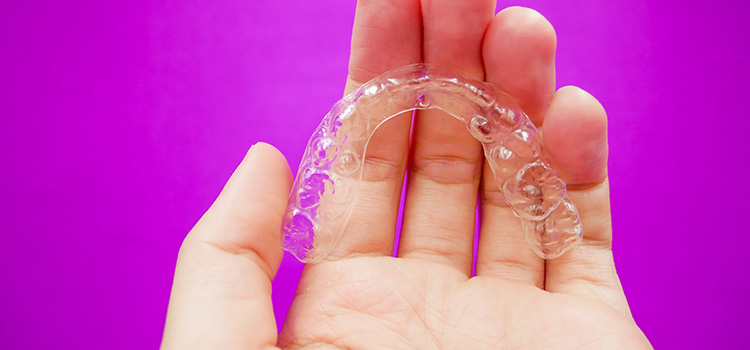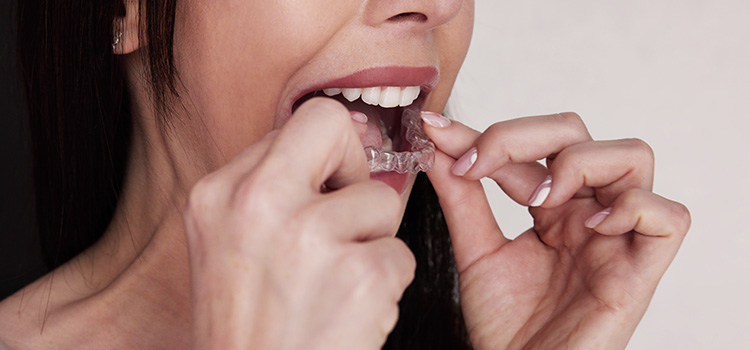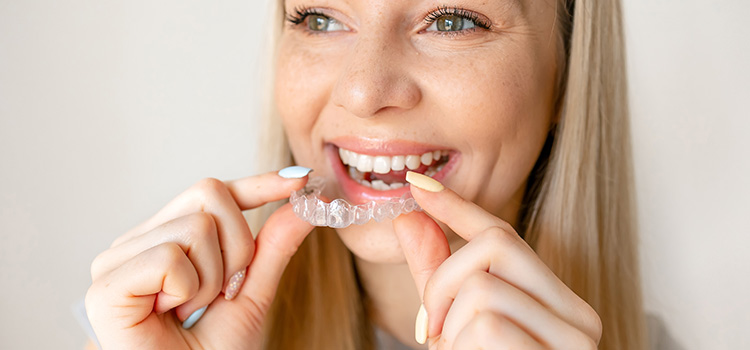Night Guard Making Teeth Grinding Worse?
13th Oct 2024

It’s not unusual to feel like you’re grinding or clenching your teeth more after starting to use a night guard. This is common and usually happens because you’re more aware of the grinding when wearing a night guard. In this article, we’ll explore the root cause of why this might happen, whether it’s something to worry about, and how to improve your experience to ensure your teeth are well-protected.

Is Night Guard Making Teeth Grinding Really Worse?
A well-fitting night guard is not necessarily going to reduce your teeth grinding. It’s designed to protect your teeth and treat bruxism symptoms. Clinical studies show that some people experience an increase in bruxism when wearing a night guard, others show no change, while some experience a decrease.
It’s possible that wearing a night guard makes teeth grinding worse. However, it’s also possible the night guard is simply making you more aware of your jaw movements. Before using it, you might not have noticed the grinding. Now, with the guard in place, you can feel it more clearly.
Note, however, an ill-fitting night guard may shift your bite or your jaw position slightly, which can cause extra grinding and clenching or tension.
Related Articles:
Should I Be Worried My Night Guard Is Making Teeth Grinding & Clenching Worse?
It can be concerning if you feel like your night guard is causing you to grind your teeth more. The good news? In most cases, a night guard provides protection and relief from bruxism symptoms even if it doesn’t reduce teeth grinding. However, it’s important to pay attention to your symptoms.

What to Do If You Feel Like Your Night Guard Is Worsening Your Symptoms
While it’s normal to feel some discomfort or a slight increase in grinding/ clenching at first, there are a few signs that might suggest your night guard isn’t working as it should:
- Jaw Pain or Soreness: Persistent pain in your jaw could mean the night guard isn’t fitting correctly.
- Headaches: Waking up with headaches regularly is another case.
- Increased Tooth Sensitivity: If your teeth are becoming more sensitive, the guard may be putting too much pressure on certain areas.
- Discomfort While Sleeping: Difficulty falling or staying asleep due to discomfort from the night guard can indicate a fit issue.
If you’re concerned that your night guard is making your teeth grinding or clenching worse, don’t worry! There are steps you can take to improve your experience and ensure your teeth are protected.
1. Consult Your Dentist for an Evaluation
If your night guard is causing issues, see your dentist. They can check if:
- The fit is correct and doesn’t put pressure on your jaw in the wrong way.
- The type of night guard is suitable for your level of grinding or clenching.
2. Adjust or Replace Your Night Guard
Sometimes, a simple adjustment can make all the difference. If your night guard isn’t fitting properly, your dentist might recommend:
- In-office adjustment: Your dentist can alter the shape of the guard or remove some material to achieve a better fit.
- Different materials: Some people may benefit more from a harder or softer night guard, depending on the severity of their bruxism.
Related Articles:
What Does the Research Say?
If you’re wondering whether night guards can actually make teeth grinding worse, you’re not alone. Clinical research has explored the effectiveness of night guards, and while they are widely recommended for bruxism, some studies suggest that the fit and type of night guard can play a role in how effective it is for patients.
- This study with 21 participants found that whether night guards increased teeth grinding depends on the individual patient. Some patients experienced an increase in bruxism when wearing a night guard, some patients showed no change, while some saw a decrease.
- Most research shows that custom-fitted night guards are effective at protecting teeth from the damage caused by grinding, such as enamel wear, fractures, and tooth sensitivity. This 4-year longitudinal study, for example, showed those who wore night guards had less tooth wear.
- However, research suggests that poorly fitted night guards, especially those bought over-the-counter (OTC), can actually cause discomfort or make clenching worse.

How to Improve Your Experience with a Night Guard
If you're finding it uncomfortable to wear your night guard, or if it feels like it's making your grinding worse, there are several ways to improve your experience. Taking some simple steps can make a significant difference in how well the guard works for you.
1. Ensure Proper Fit and Comfort
The most important factor in improving your experience is making sure the night guard fits correctly. A poorly fitted night guard can cause jaw discomfort or increase clenching.
Custom vs. Over-the-Counter Night Guards:
- Custom night guards are made specifically for your teeth, offering a better fit and greater comfort.
- Over-the-counter are one-size-fits-all and may not align with your jaw correctly, leading to discomfort or increased clenching.
For the best protection and fit, custom night guards are typically the better choice. If your night guard feels uncomfortable, ask your dentist to adjust it. Small changes in the fit can reduce discomfort.
2. Practice Stress Management Techniques
Managing stress can reduce teeth grinding. Here are some methods to help:
- Relaxation exercises: Deep breathing or meditation before bed can calm your mind and reduce nighttime grinding.
- Regular exercise: Physical activity, like yoga or even light stretching, can reduce tension in your jaw muscles.
- Limit caffeine and alcohol: Both caffeine and alcohol can increase muscle tension and make bruxism worse, so try to avoid them in the evening.
3. Improve Your Sleep Environment
Your sleeping environment can impact how often you grind your teeth. Consider these tips to make your sleep environment more relaxing:
- Sleep positions: Sleeping on your back can sometimes help alleviate pressure on your jaw.
- Comfortable bedding: Ensure your pillows and mattress provide proper support, particularly for your neck and jaw alignment.
4. Jaw Exercises to Relax Muscles
Doing simple jaw exercises before bed can help relax your muscles and reduce the risk of clenching during sleep. Try these easy jaw exercises for bruxism:
- Jaw Stretches: Open your mouth wide and then slowly close it while keeping your teeth apart. Repeat several times.
- Side-to-Side Movements: Move your lower jaw side to side gently, holding for a few seconds on each side.

- Most Popular
- Hard Outside, Soft Inside
- 2MM Thick
- Moderate / Heavy

- Most Durable
- Hard Materials
- 1.5MM Thick
- Heavy / Severe

- For Day Time Use
- Thin, Barely Visible
- 1MM Thick
- Light / Moderate

- For Clenching
- Flexible & Soft
- 1.5MM Thick
- Light / Moderate
Can Wearing a Night Guard Cause Long-Term Damage?
Wearing a night guard is generally safe and effective for most people. However, if it’s not fitted properly or if it worsens your grinding or clenching, there could be some potential risks. Understanding these risks can help you take the right steps to protect your dental health.
Potential Risks of an Improperly Fitted Night Guard
An ill-fitting night guard can cause several problems, especially if it's not aligned with your bite. Some potential long-term issues include:
- Jaw Misalignment (TMJ issues): A night guard that shifts your jaw out of its natural alignment can cause strain on your temporomandibular joint (TMJ), leading to pain and discomfort.
- Increased Clenching: A poorly fitted night guard might cause your jaw muscles to overcompensate, leading to even more clenching or grinding.
- Damage to Teeth or Gums: If the night guard places uneven pressure on certain teeth or areas of the gum, it could result in damage over time, such as tooth sensitivity or gum irritation.
How to Prevent Long-Term Issues
To avoid these risks, it’s essential to ensure your night guard fits properly and is well-maintained. Here’s how to protect yourself from potential damage:
- Get a Custom-Fitted Mouth Guard: Custom guards, made specifically for your teeth, are less likely to cause alignment issues and discomfort.
- Regular Check-Ups: Have your dentist regularly evaluate your night guard to ensure it’s still fitting correctly and isn’t causing problems.
- Monitor for Signs of Trouble: If you notice any new discomfort, jaw pain, or changes in your bite, contact your dentist right away.
Can Night Guards Worsen TMJ?
In some cases, night guards can worsen TMJ symptoms, especially if they’re not designed for people with TMJ disorders. If you already have TMJ, your dentist might recommend a specific type of mouth guard for TMJ that won’t aggravate your condition.
How Pro Teeth Guard Can Help You Find the Right Night Guard
If your night guard feels uncomfortable or seems to make your grinding worse, a custom-fitted mouth guard could be a better option. At Pro Teeth Guard, we create guards specifically designed to fit your teeth, making them more comfortable and effective at reducing clenching.
Our simple process allows you to take your teeth impressions at home, and we’ll craft a night guard that fits perfectly. Plus, with our 60-Day 110% Money Back Guarantee, you can try it risk-free. If it’s not the right fit, we’ll refund you and cover return shipping.
Finding a night guard that works for you can make all the difference for your comfort and dental health.
Conclusion
If you feel like your night guard is making your teeth grinding or clenching worse, it’s often due to increased awareness or a poor fit. The good news is that with a properly fitted, custom night guard, you can protect your teeth comfortably and effectively.
Always consult with your dentist if discomfort persists, and consider exploring custom options like those from Pro Teeth Guard to ensure the best results.
Remember, protecting your teeth from the effects of grinding is crucial, and finding the right solution can make all the difference for your dental health and sleep quality.
Resources:

- Most Popular
- Hard Outside, Soft Inside
- 2MM Thick
- Moderate / Heavy

- Most Durable
- Hard Materials
- 1.5MM Thick
- Heavy / Severe

- For Day Time Use
- Thin, Barely Visible
- 1MM Thick
- Light / Moderate

- For Clenching
- Flexible & Soft
- 1.5MM Thick
- Light / Moderate

